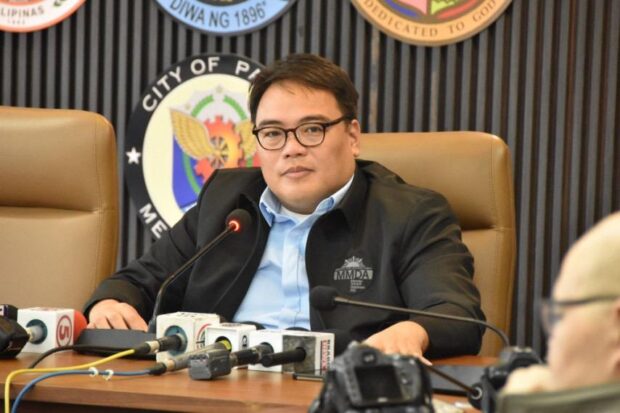
Metropolitan Manila Development Authority (MMDA) acting Chairman Don Artes speaks to the media amid recent Supreme Court decision invalidating the authority of Metro Manila LGU traffic enforcers to issue violation tickets. INQUIRER FILES
MANILA, Philippines — The Metropolitan Manila Development Authority (MMDA) on Wednesday reminded motorists that local traffic enforcers may still issue traffic violation tickets.
“There is nothing in the decision which said that it is final and executory,” said MMDA Acting Chair Don Artes referring to a recent Supreme Court decision that invalidates Metro Manila local government units’ (LGUs) authority to issue violation tickets.
READ: SC voids Metro Manila LGUs’ issuance of traffic violation tickets
“So to our fellow countrymen who are motorists, if you are apprehended by local traffic enforcers, do not argue with them and say that per the Supreme Court, they are no longer allowed to issue tickets because [the decision] is not yet final and executory,” he advised.
In a 41-page decision made public on Monday, the High Tribunal declared that the MMDA has exclusive power to formulate policies on road traffic in the National Capital Region.
Invalidates
The decision invalidates the traffic ticketing ordinances of Makati, Taguig, Parañaque, Pasay, Quezon City, San Juan, Navotas, Las Piñas, Pasig, Muntinlupa, Mandaluyong, Valenzuela, Caloocan, Manila, and the municipality of Pateros.
But because the ruling is not final, Artes reminded that local officials in Metro Manila still have 15 days to file a motion for reconsideration before the Supreme Court to air their side on why their localities need their own unique traffic regulations.
The MMDA, while pleased that the Supreme Court has recognized their power to make and enforce traffic regulations, explained that it would prove difficult for the LGUs to adhere to the single code on traffic that the MMDA previously established.
READ: That’s ‘chaos’, warns MMC after SC voided LGU traffic receipts
This is because the LGUs, Artes explained, have their own “peculiar circumstances.”
Only 20 common violations
“In fact, if you can recall, only 20 common violations were identified there [Metro Manila Traffic Code]. And we have deferred the other traffic violations and regulations to the LGUs because they have their own unique needs, peculiar circumstances. We allow them to determine what regulations are needed in their respective localities,” the official explained.
A common example, he said, would be the number coding schemes which some local governments implement differently.
“We need to study this properly and decide on it as a body because this [ruling] has implications not just for the respondents but for the traffic situation in the entire Metro Manila,” he noted.
The MMDA and the mayors of Metro Manila are set to convene on Tuesday to address the issue and fill the gaps in case the decision becomes final and executory, informed Artes.